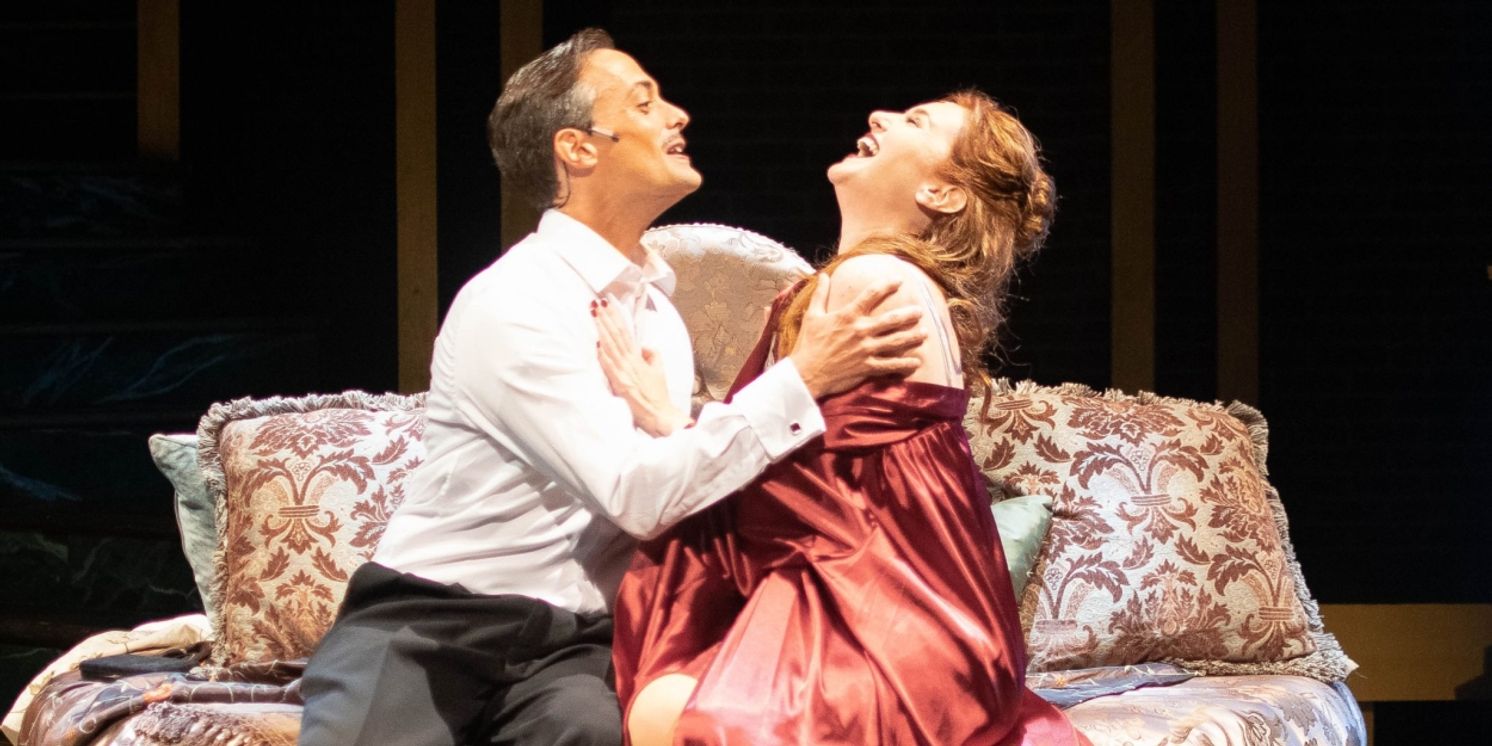Review: GRAND HOTEL Seasons Melodrama with Melody at Front Porch Theatricals
Now through August 28th.

I went into Front Porch's Grand Hotel knowing next to nothing about the show other than the audition standard "Love Can't Happen," and that it's the musical with "the funny legs dance" (I didn't even remember the name of the song). Halfway through the show's single act, I started to think, "this feels familiar," as plot point after plot point appeared just as I expected them... and not cliches either. Finally it clicked for me: Grand Hotel is based on the classic film and novel of the same name, which was eventually adapted and modernized into HBO's meme-spawning tragicomedy The White Lotus. While the sweeping production at the New Hazlett may not have Jennifer Coolidge, it has a cast seemingly of thousands, some incredibly sweeping melodies, and a totally appropriate, if sometimes strange, sense of dignity and tragicomedy.
The multi-leveled three-sided thrust of the New Hazlett lends itself well to stories taking place in multiple places at once, such as the many rooms and corridors of the Berlin Grand Hotel in its 1920s heyday. The musical, written first by Robert Wright and George Forrest but later heavily revised by Maury Yeston and Peter Stone, tells the story of one rather complicated set of days in the hotel for its temporary residents. The show follows two intersecting storylines: in one, an international businessman on the verge of collapse (Daniel Krell), an ambitious typist with dreams of stardom (Betsy Miller) and an aging, terminally ill Jewish accountant (Jason Swauger) wind up in a tangled web together; in the other, a penniless Baron turned small-time hustler (Scott Pearson) finds a likely mark in the beautiful but aging prima ballerina of her era (Daina Michelle Griffith). As these two stories overlap and intersect, they run through the gamut of hotel life, crossing paths with maids, scullery workers, song-and-dance men and even gangsters. The plot swings back and forth wildly between dark, melodramatic, soapy moments and broad, even silly comedy, but it's all held in check by an essentially nonstop score of songs, dances, musically-staged scenes and underscores. The direction by Scott P. Calhoon, in close collaboration with choreographers Danny Herman and Rocker Verastique, keeps the show from tipping tonally in One Direction or the other or succumbing to its complicated nest of plots.
The cast is top-notch, and attention must be paid to the understudies and swings; during this late-COVID era, theatre from Broadway to Pittsburgh is being staged largely on the labor of its swings stepping into any role at any given time. At opening, swing Patrick Mizzoni, who has the unenviable job of covering nearly every single male role in the show, went on as the show's cynical narrator, the drug-addicted war casualty Colonel-Doctor. According to the program, Mizzoni covers everything from young studs and gigolos to crippled old men, and he performed with great charisma in the role, even though his leading-man looks and build were at odds with the wizened and deformed old Doctor.
There's not a single bad performance in the cast, though the two characters who emerge from the complex stew as its standouts and our de facto lead characters are definitely Daina Michelle Griffith as Grushinskaya and Scott Pearson as the Baron. Griffith reads rather young for the character, which actually plays in the show's favor: Grushinskaya is morbidly concerned with her aging, despite everyone insisting she is still young and beautiful and gifted: with a warm and charming actor like Griffith in the role, the character comes across as a neurotic in need of getting her groove back, as opposed to a relic being coddled by her underlings. Griffith brings humor and lightness to the prima ballerina's brooding nature, cutting through the chilly Garbo-ness of it all with a winning human streak. Her opposite number, Scott Pearson, has one of the trickiest leading-man roles in musical theatre: we need to believe in his higher nature despite his constant reminders how low he's sunk. "I am not a thief," he says, as his poverty forces him to steal. "I am not a gigolo," he says, even as it's made clear he has kept himself afloat by seducing wealthy women. But when Pearson sings or turns on the charm, all is forgiven. (In Calhoon's staging, this is also one of the more physically demanding roles this side of Tarzan, as Pearson must swing from beams, make grand leaps and do a full Mission: Impossible stealth routine twice in the show.)
Grand Hotel may not be a show for everyone: it's extremely theatrical, the way some seafood is "very fishy." Either you immediately dig the heightened aesthetic and melodrama, the near-constant music and sweeping sentiments, or you don't. But to me, this show is a lost gem, one of those staged-to-the-tiniest-detail mega-musicals that has been lost to history. The genre has fallen out of favor, and is largely overshadowed today by the similarly grand and intricate Phantom of the Opera. But I'll take Maury Yeston and company over Andrew, Lord Sydmonton any day of the week. It's a treat to see a show like this rediscovered anywhere- and right in our backyard here in Pittsburgh? I'll raise a glass to that!
Reader Reviews
Videos

